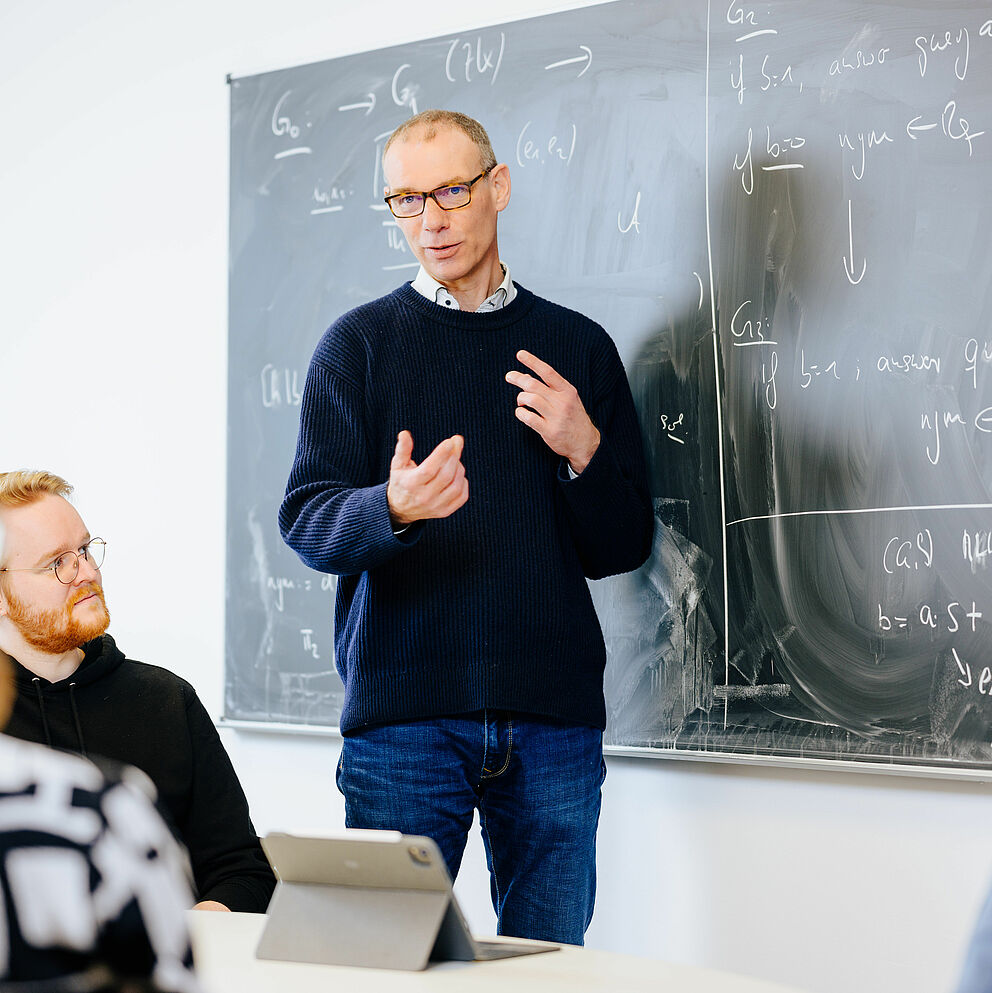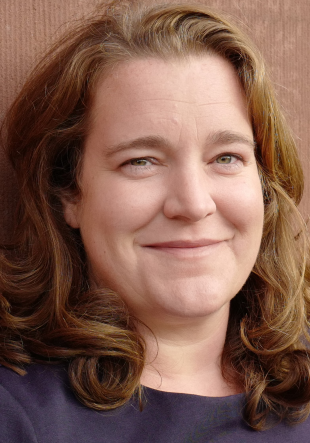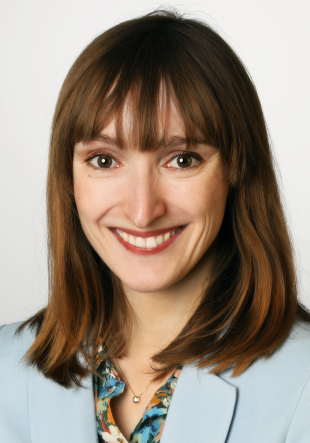Profile Phase For A Professorship
In the advanced postdoc phase, i. e. in the two to six years after your doctorate, you prepare for a career in academia, e. g. as a tenure track professor or as a senior researcher at a research institute. Ideally, you are awarded a junior research group leadership, a junior professorship, or a tenure track professorship at this stage. The Jenny Aloni Centre for Early Career Researchers provides you with information and advice on all aspects of your academic qualification.
Qualification & Funding
When preparing for a professorship, there are different qualification paths you can pursue that simultaneously fund your reseach and prepare you for a professorship.
Leading a junior research group enables postdocs to research and teach independently and to take on staff and budget responsibility. This qualifies them for academic leadership positions, in particular for an appointment to a professorship.
Junior research group leaders play an important role at Paderborn University. At Paderborn University, 'junior research group leader' presents a formal, official, and standardised status within the university. The junior research group is scientifically and financially independent, it is sufficiently equipped, and the junior research group leader has personnel and budget responsibility.
Junior research group leaderships are regularly advertised by Paderborn University.
Externally funded junior research group leaders are also welcome at Paderborn University. The following third-party funded junior research groups (usually 5 years duration) currently exist in Germany:
- Emmy-Noether Programme of the DFG
- ERC Starting Grant of the EU Framework Programme for Research and Innovation
- NRW Return Programme of the NRW Ministry of Culture and Science
The Research Department can help you with individual questions regarding applications for third-party funding.
>> Go to the Research Department |
In order to be appointed to a W1 junior professorship, you usually require an outstanding doctorate and, if applicable, further academic achievements, as well as pedagogical-didactic aptitude. Further subject-specific qualifications may be required.
Junior professors are appointed for a fixed term in a quality-assured appointment procedure. The initial appointment is for three years. In the third year, an interim evaluation takes place, which decides whether the person has proven themselves as a university teacher and whether the junior professorship will be extended for another three years. The focus of the evaluation is on research and teaching performance, but activities within academic self-administration are also taken into account.
Although formally junior professors are university teachers, they are also classified as early career researchers due to their qualifications and temporary status. Nevertheless, because they are university teachers, they basically have the same rights and obligations as permanent professors. Junior professors conduct research and teach independently, they participate in academic self-administration and have the right to supervise doctoral students. However, the teaching duties are lower for junior professorships (4 hours per week in the 1st phase, 5 hours per week after the successful interim evaluation).
Junior professorships are regularly advertised by the university.
A relatively new career path in the German research system are tenure track professorships.This means that a fixed-term W1 or W2 professorship will will be converted into a permanent W2 or W3 professorship after a positive evaluation.
Paderborn University has anchored tenure track professorships as an additional career path throughout the university. The aim is to offer excellent young researchers with great potential an early, reliable career perspective. Tenure track professorships open up a structured and transparent qualification path, which ideally prepares for the intended follow-up position through accompanying, coordinated personnel development measures.
Tenure track professors at Paderborn University independently lead long-term research projects, which are embedded in the university's development planning and thus form an important pillar of research at the university.
Detailed information on the conditions and requirements for obtaining a tenure track professorship can be found in the tenure track regulations of Paderborn University.
Tenure track professorships are regularly advertised by Paderborn University.
Paderborn University regularly awards scholarships and project funding to postdocs from all faculties. For more information, please see the current announcements of the Committee for Research and Junior Academics..
If you already meet all the requirements to be appointed to a tenured professorship, you can apply to the DFG in the Heisenberg Programme or to the EU for a Consolidator Grant.
While you prepare for an advanced position in research, these programmes allow you to continue your research projects at a location of your choice and to further increase your academic reputation.
The Research Department will assist you with individual questions regarding applications for third-party funding projects.
>> Go to the Research Department |
Going Abroad

A stay abroad can give you access to special sources, expand your knowledge and language skills, and strengthen your international network. At the same time, a stay abroad can be an advantage in applications and in funding proposals, as it illustrates that you think across borders, are open to new things, and can engage with different academic cultures. But above all, it is a valuable experience. Here you can find information on what stays abroad are possible in the qualification phase and what to bear in mind when organising your stay.
Steps To A Professorship
If you are planning on becoming a professor, there are various steps you should take during the profile phase:
In addition to research and teaching, one of the central tasks of a professor is participation in academic self-administration. Hence, you should get involved in academic self-administration as an advanced postdoc if you are working towards becoming a professor. On the one hand, you thereby gain insight into the political processes at your university. On the other hand, having participation in academic self-administration on your CV may prove an advantage in later applications.
In Germany, the traditional path to a professorship is through 'Habilitation.' Habilitation signifies the ability to independently represent a scientific subject in research and teaching. To obtain habilitation, you usually need to write a dissertation with significant impact for your academic field, hold a presentation with a subsequent colloquium, and, if applicable, teach a course related to the respective degree programme.
Alternatively, so-called 'habilitationsäquivalente Leistungen' (i. e. qualifications equivalent to habilitation) can be accepted in appointment procedures. There are no generally applicable rules on what is to be understood by habilitation-equivalent qualifications. It is up to the respective higher education institution to define requirements, which can usually be found in the respective habilitation regulations ('Habilitationsordnung').
An interim professor is temporarily assigned to perform the tasks of a vacant professorship (usually for one or two semesters). While requiring a completed habilitation, such interim professorships offer experienced postdocs an opportunity to practise professorial activity before they are appointed professors themselves.
Interim professors hold the same responsibilites as a full professor would. Although there is no statutory or collectively agreed remuneration regulation for interim professorships, it is common practice that the remuneration is based on W2 or W3 salaries.
Other than vacant full professorships, interim professorships do not have to be advertised, and neither do regulations regarding appointment procedures apply.
When a professorship is created or becomes vacant, the respective faculty is first involved in determining whether the position should be filled and, if so, in which subject area. The professorship is then advertised publicly and, as a rule, internationally.
In a next step, the faculty members assemble an appointment committee to review the applications. Suitable applicants are usually invited to a test lecture (in German colloquially called "Vorsingen," i. e. "audition") and a subsequent interview with the commission. Very often, the commission will also ask external professors close to the subject for their opinion.
On this basis, the appointment committee submits an 'appontment list' ("Berufungsliste"), i. e. a ranked list of proposed candiates, to the faculty. Usually, this list consists of three people which are ranked according to their qualifications as well as their performance in the test lecture and interview.
After the faculty members have passed a resolution on the appointment proposal, it is forwarded to the central collegial body and, having been put to a vote, to the body responsible for making the appointment, which may be the university administration or the responsible ministry, depending on the federal state.
The candidate who has been the first choice then receives their appointment ("Ruf"), which marks the start of the so-called appointment negotiations. As a rule, these are concluded with a written offer of appointment and the subsequent appointment. Further information on appointment regulations can usually be found in the respective orders of each higher education institution.
Career Paths

Aside from becoming a university professor, university management, business, and politics also offer attractive perspectives for your career.
As part of the "Career Spotlight" event series of the Jenny Aloni Centre for Early Career Researchers, you have the opportunity to get to know the various career paths after your doctorate and to talk to people who have already taken them.







